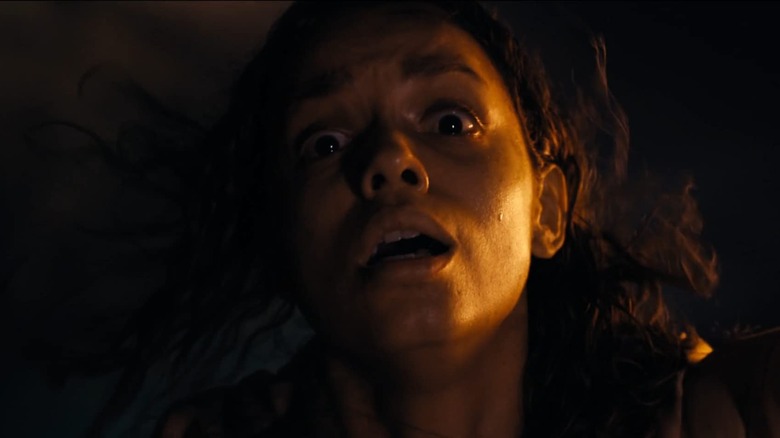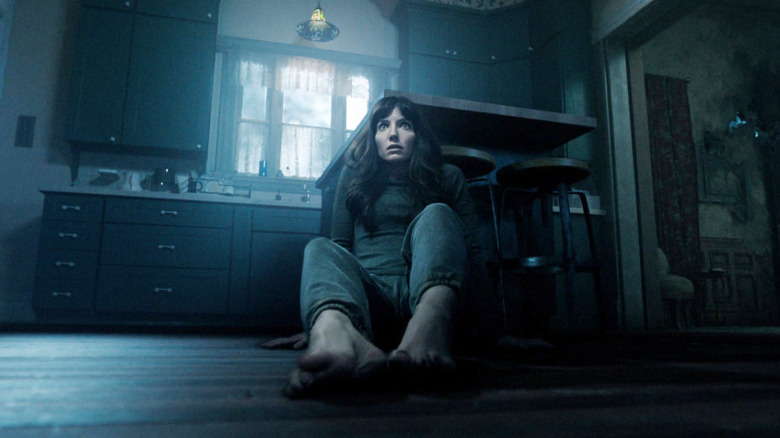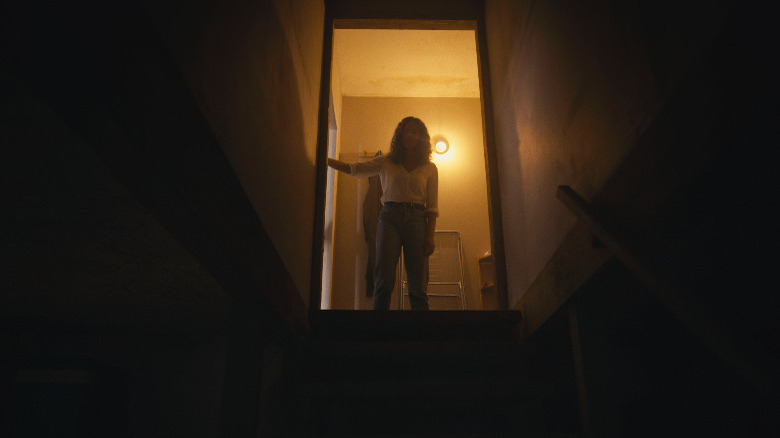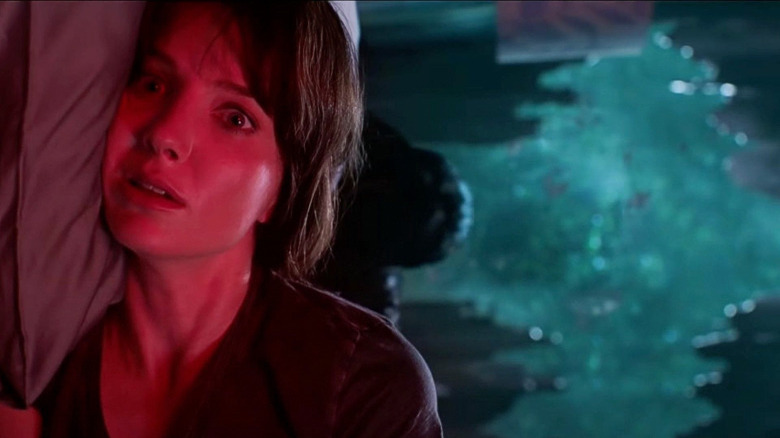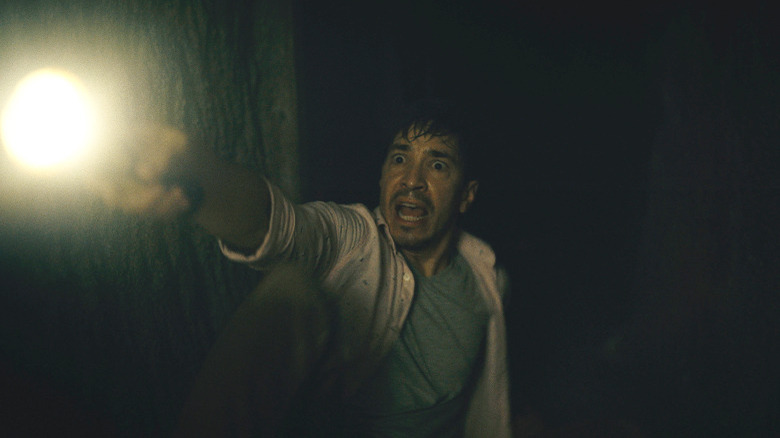Barbarian Is The Closet Thing 2022 Has To Its Own Malignant
This article contains spoilers for "Malignant" and "Barbarian."
I went into "Barbarian" knowing nothing about the film beyond its logline and main cast. Dear reader, believe me when I tell you it was the best way possible to enjoy writer and director Zach Cregger's horror movie, a subversive take on the genre where the red herrings and misdirection are virtually indistinguishable from the actual foreshadowing. I would say I can't remember the last time a film took me on such a wild and unpredictable ride, but that isn't true. It was almost exactly a year to the day ago when the gonzo, go-for-broke swing that is James Wan's "Malignant" came out.
Both "Malignant" and "Barbarian" center on people who, when the films begin, are stuck in toxic situations. In "Malignant," Annabelle Wallis plays Madison, a pregnant woman who has had multiple miscarriages and is married to an abusive husband. In "Barbarian," Georgina Campbell plays Tess, a woman who is trying to move on from a bad relationship while interviewing for a new job. Each of these women invite our sympathies and make us root for them right off the bat, well before we come to know them as people. It's a good thing, too, because this is where things get weird (like, really weird), and it would be easier to check out if you didn't already care about what happens to them.
Setting the stage
Directed by Wan, drawing from a story he co-wrote with Ingrid Bisu and Akela Cooper, "Malignant" opens with a flashback to a research hospital in the 1990s where a mysterious patient named Gabriel is being treated. It's only after this that we meet Madison in the film's present-day. But more than a clever way of spurring viewers to try and figure out how she and Gabriel are linked, this prologue is the perfect tone-setter for the rest of the movie. With its Gothic setting, theatrical camera angles, and campy line-readings ("It's time we cut out the cancer!"), it's clear this is Wan's unironic love letter to Giallo cinema and its unique blend of slasher, exploitation, and mystery elements.
"Barbarian," on the other hand, starts off firmly rooted in the real-world. When Tess arrives at a rental home in the middle of the night, the film is shot and edited in a very matter-of-fact way. Even when she learns the place she rented has been double-booked by a man named Keith, Tess and Keith respond as you might expect any two regular people to react to such a situation. If we're on edge, it's because Tess has a lifetime of experiences as a woman who's learned to pick up on any and every possible red flag she spots. Then there's also Anna Drubich's sinister score and the fact Keith is played by none other than Pennywise the Dancing Clown, Bill Skarsgård, both giving us reason to pause.
Unique structures
After Madison's husband is killed, and she is attacked in what seems to be a home invasion, "Malignant" settles into the groove of a murder-mystery. As the killer moves on to other victims, Madison begins to have visions of their horrific crimes. Just as strange, she starts to uncover dark and bizarre secrets about her past, like the fact she has no memories of her life prior to being adopted when she was 8. Madison also had an imaginary friend named Gabriel, whom she would speak to in ways that unsettled her parents. Yet, even as it reveals more and more, the film does an excellent job of making it unclear how all these puzzle pieces fit together.
Similarly, "Barbarian" heavily hints something awful will happen after Tess decides to spend the night at the rental home with Keith. She briefly wakes up to find the door to her bedroom inexplicably open and Keith having a nightmare as he sleeps in the living room. And then... it's the next morning. Everything's fine, and Tess races off to her job interview after over-sleeping, along the way noting the neighborhood around her rental home is entirely rundown (a detail she missed the night before in the dark of night and pouring rain). It's a terrific subversion, having Tess cross paths with a stranger on a dark and stormy night in a creepy area, only for nothing bad to actually happen.
It's only after her interview that things go south for Tess. A local homeless man chases her into the rental house, insisting she get out. Then, a search for toilet paper sends Tess into the house's basement, where she uncovers a disturbing hidden room with a camera and a flight of stairs leading into a subterranean tunnel inhabited by a mutated figure dubbed "The Mother," played by Matthew Patrick Davis.
The big twists
What's great about the big twist in "Barbarian" (besides its shocking nature) is the film cuts away from Tess and Keith right after it occurs. Suddenly, we seem to have entered a completely different movie starring Justin Long as AJ Gilbride, a scummy actor in Los Angeles who, in an all-too-timely sub-plot, is accused of sexually assaulting his co-star. Realizing he's going to need all the money he can get to cover the legal costs for his impending lawsuit(s), AJ looks into selling some of the real estate he owns. Sure enough, that includes the place where Tess and Keith were staying in Michigan.
Speaking of entering different movies, "Maleficent" shifts from a murder-mystery to a splatter film when it's revealed Gabriel is not an imaginary friend at all, but he's a parasitic twin in the form of a teratoma living in the back of Madison's head. After her husband hit her head against the wall, it re-awakened Gabriel, who can control Madison's body by making her move backwards, and he's been killing all the doctors who operated on Madison when she was younger. What follows is a hilariously gory, high-octane action scene in which Gabriel lays waste to a police station, starting with a prison cell full of what might best be described as 1970s prison film stereotypes.
Likewise, "Barbarian" has fun drawing out the suspense when AJ discovers the hidden room and tunnels in his rental house, only to ignore all the tell-tale signs of danger and react with delight upon learning he can include all this space as part of the building's square footage. This (very funny) move into dark comedy comes as natural to "Barbarian" as it does to "Malignant," as does the transition back into pure horror when The Mother finds AJ mucking about in her home.
Sticking the landing
As fun as the third act of "Malignant" is, it's "Barbarian" that does a better of bringing its story to a satisfying, cohesive conclusion. Far from a straight chase to the end, the third act of "Barbarian" kicks off a flashback to AJ rental's house in the 1980s. In what is by far the most visually-stylized sequence in the movie, we learn the place once belonged to Frank (Richard Brake), a man who would kidnap women and film himself raping them before raising their ensuing kids and repeating the horrifying cycle until it gave rise to The Mother.
This utterly disturbing back-story is the perfect capstone to "Barbarian" and its themes, which include toxic cycles, gender-based privilege, and the fact that rape culture has always lurked beneath a facade of politeness and decency. Just as fitting is the way the film ends on an almost sentimental note, with The Mother saving Tess (believing Tess to be her "baby") after Tess flees her prison and comes back for AJ, only for him to literally throw her off a nearby water tower in a bid to save his own skin. Tess still ends up shooting The Mother in the head to get away, but it's framed as a necessary evil and not a moment of triumph. The Mother, after all, is a victim in her own way, as the movie recognizes.
"Malignant" struggles to stick the landing quite as well. It only skims the surface of the ideas it raises about trauma and women's rights to their bodies, and its last-minute transformation into a touching story about sisters is flimsily set-up in advance. But it's also a lot like "Barbarian" in that the experience of watching it is as exhilarating, surprising, and otherwise thrilling as movies get.
"Barbarian" is now playing in theaters.
